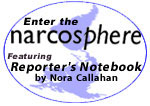 |

|

|
Director's message -- by Nora Callahan
Whim and caprice of men, or rule of law?"The awful instruments of the criminal law cannot be entrusted to a single functionary." -- U.S. Supreme Court in McNabb v. U.S., 318 U.S. 332 (1943)
"I'll do it my way." Alice says. The Queen screams back, "Your way? All 'ways' are my ways!" In September, U.S. Attorney General John Ashcroft ordered federal prosecutors to seek the toughest punishment for criminal defendants, and restricted the use of plea bargains to 'special situations'. Ashcroft also ordered prosecutors to report any federal judges using the legal provision for 'downward departures' allowed by Congress in 1994. In other words, "Your way? All 'ways' are my ways!" "I saw the writing on the wall,"
said Kristine Wilkes, a US prosecutor in San Diego who resigned.
"I felt like my discretion was being taken away," she
told reporters. The writing on the wall brought an interesting prediction from the Heritage Foundation's Paul Rosenzweig. In November, he testified before the American Bar Association's Kennedy Commission saying that the Ashcroft edict will force Congress to be accountable for sentencing laws, and blames Congress, not prosecutors or courts for problems that exist today. "The elected legislator, not the un-elected prosecutor, is ultimately the public's principal means of checking prosecutorial excess it is Congress, in the end, that defines what is a crime and how severely an offender must be treated." I've studied these laws closely, for nigh on fifteen years now, my brother Gary Callahan having been indicted in 1989. And examining current world affairs keenly, you'd think that leaders and commentators alike think that this country is run on the edict of individuals - or single groups of individuals. Our government was built to house a system of 'checks and balances' -- hence both authority and blame need to get spread out. Our Constitutional Founders agreed on these principles, and they have been well defined and tested throughout the years. Together, these principles are called "The Rule of Law", and we go by these rules to prevent being ruled by the 'whim and caprice' of men (or women). When we see ourselves ruled by whim and caprice, it's because our system of checks and balances got stuck, and started rolling backward. In ordinary life things can go to hell in a hand-basket in a hurry when major pieces of equipment don't work the way they are supposed to. I ran across an old legal case last month when reading about prohibition era law and excess policing. The 1943 McNabb case sheds light on dark corners of zealous law enforcement. It shares insight into respect for the 'rule of law' and provides much to ponder for judges, members of congress, and executive administrators today. About 65 years ago, during the late 1930's in the Tennessee Mountains, the McNabb family was selling whiskey and avoiding taxes. People were in the grip of the Great Depression, and having a difficult time getting by. Federal prohibition enforcement agents became "revenue police" after alcohol prohibition ended in 1931. The McNabb case begins when agents set up a 'buy' with informants. At the designated hour of night, in an Appalachian cemetery, came the 'bust'. Today it is called a 'buy and bust,' a drug war tool used often, in every town and city across the country, and hardly a justice blinks an eye. In the early 1940's, when the Supreme Court reviewed the McNabb case and police procedure from start to finish, many tactics were seen as outside the bounds of "civilized standards". The justices, in addition to acknowledging that the defendants' most basic legal protections were violated, got the perception that the police were 'overzealous' throughout.
In the court's reversal of the McNabb's convictions the justices would say, "Zeal in tracking down crime is not in itself an assurance of soberness of judgment. Disinterestedness in law enforcement does not alone prevent disregard of cherished liberties. Experience has therefore counseled that safeguards must be provided against the dangers of the overzealous as well as the despotic". The justices brought into question the 'civilized standards' of procedure and evidence saying, a "democratic society, in which respect for the dignity of all men is central, naturally guards against the misuse of the law enforcement process." "The rule of law signifies the constraint of arbitrariness in the exercise of government power.... It means that the agencies of official coercion should, to the extent feasible, be guided by rules - that is, by openly acknowledged, relatively stable, and generally applicable statements . . . The evils to be retarded are caprice and whim, the misuse of government power for private ends, and the unacknowledged reliance on illegitimate criteria of selection. The goals to be advanced are regularity and evenhandedness in the administration of justice and accountability in the use of government." - John Calvin Jeffries, Jr., Legality, Vaugueness and the Construction of Penal Statutes, 71 Va. L. Rev. 189, 212 (1985). In short, legal procedures involving defendants from arrest to the court, and into the prison - all legal process, from lawmaker to law enforcement - must follow procedures that ensure checks and balances at every step, not only to guard against injustice - but because this defines justice! Civilized people are to conduct themselves in a civilized manner. Otherwise - we aren't civil anymore. That is what the McNabb case tells me, the layperson. And more. Congress is charged with writing laws reflecting the will of the people they represent. The executive branch administers enforcement of those laws. Justices make up the courts, where interpretation of law, fairness and constitutionality are determined, and also, formulation and review of administration of federal law. Good laws should not need a lot of force - to enforce. Thus, when we see a lot of force, too many zealous enforcers, we need to look at the policies behind the enforcement. Did this happen in a recent ruling? A December 2003 Supreme Court decision regarding domestic policing insists that a person can reach the front door in 20 seconds. And if you can't make it from your bed, to housecoat, to front and back doors in 20 seconds, then fully armed police can barrel them down with blessings of US high counsel. How often is the raid based on informants' unreliable information? You have 20 seconds to defend that. The recent school raid in South Carolina suggests that the "dignity of all men" is no longer "central" if it's about drugs. On the whim and caprice of one leader, a high-school principal this instance, a police force with loaded and pointed guns rushed into the hallways full of kids. Terrifying! You can view photos of it here. When Ashcroft can order a judge 'reported' if he follows the intent of Congress - the principles of checks and balances fall off the scales of justice. "The complicated process of criminal justice is therefore divided into different parts, responsibility for which is separately vested in the various participants upon whom the criminal law relies for its vindication." The young McNabbs, decades ago, were taken from their homes in the night to federal police interrogations, not booked by a local agency, not able to have counsel of friends, family or attorneys. Local involvement is supposed to be part of the checks in the system. Sixty-five years later, once-separate law enforcement agencies work hand in glove. State, federal and city police create 'task forces' - not balance. Interrogations of defendants by these merged agencies are routine today. People suffer under police agency mergers, and thus endure the whim and caprice of enforcement administrators from "Top Cops" to high school principals. To lose these vital checks and balances is to disrespect hard-won progress made in our 200-year-old experiment fighting for, and building, a system of justice - evidence of a healthy democracy. What is there about our criminal justice system that would point to a healthy democracy? Caprice and whim, whether by devilish design or baseless change of mind, have no place in the criminal justice system - which is why the instruments of criminal law cannot be entrusted to a single functionary. Furthermore, police aren't supposed to choose one law to get excited about over another. When we see this in a policy, it is a policy that has lost its balance. Balance in government is a most fundamental value, because whim and caprice are the hallmarks of dictators and undemocratic regimes. One more time: The goals to be advanced are regularity and evenhandedness in the administration of justice. This isn't happening today. Two million prisoners and the countless millions who love them are undeniable proof of this. History teaches that in times such as these the people harmed most become part of the force that pushes into motion the rusty mechanism of checks and balances. Public outcry is the final check on a system that has lost its balance, and replaces dignity lost when injustice is crushing. That is why rule of law includes our right to speak out individually, and together let our voices be heard by fellow citizens and leaders alike. I highly recommend it. Join our organization and begin to work by learning to write and talk to others. The easiest way to make our voices and opinions known to lawmakers, judges, and enforcement officials is a good old-fashioned written and stamped letter a postman can deliver. And when they hear from you, remember to include your address and phone number. Your lawmaker and some public officials will add you to notification lists. This helps you build a relationship with your leader, know what they are up to, and how they think about issues you care about. Remember, where the buck starts and stops in the US of A is really a series of checkpoints along the way. Below is contact information of some of those checkpoints. Please share your views and circumstances with them in the coming days - if we don't, who will? Remind them of cherished principles, and tell them about the drug law and sentencing reform you want.
|
 In quiet
late nights, I'll delve into an old history book or current periodical.
Looking at the past helps me understand the present. I'm struck
by how often leaders demand, "You have to do it my way."
Alice in Wonderland scenes come to mind.
In quiet
late nights, I'll delve into an old history book or current periodical.
Looking at the past helps me understand the present. I'm struck
by how often leaders demand, "You have to do it my way."
Alice in Wonderland scenes come to mind.